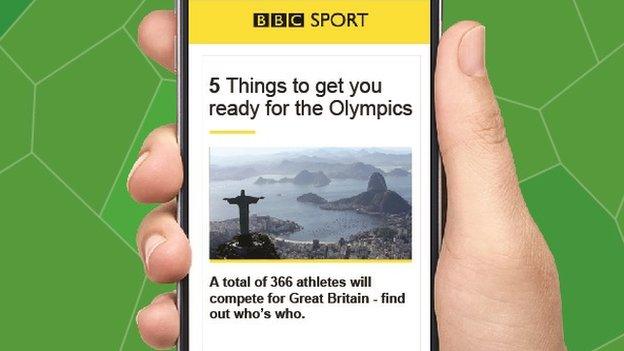Rio 2016 Olympics: an opening ceremony of warmth, passion and hope
- Published
- comments
So there was no Pele, volleying a fireball into the Olympic cauldron. There was none of the shock and awe that defined Beijing's opening ceremony eight years ago, and less of the humour and history that made London 2012's first night so special.
But there were dancing microbes, and super-cities, and Gisele Bundchen as the Girl From Ipanema. There were giant yellow butterflies, and passinho dancing from the favelas. There was drumming - there's always drumming - and there was carnival, of course.
And if nothing could ever top the Queen skydiving out of a helicopter with James Bond alongside, then no-one should ever try. This is Rio's party, and at last it has begun.
Opening ceremonies aren't meant to make much sense. Did the rest of the world really understand the collective glow of happiness across Britain when London's first three minutes featured Radio Four's shipping forecast, the Wind in the Willows' Mole and Ratty and the EastEnders drum intro?
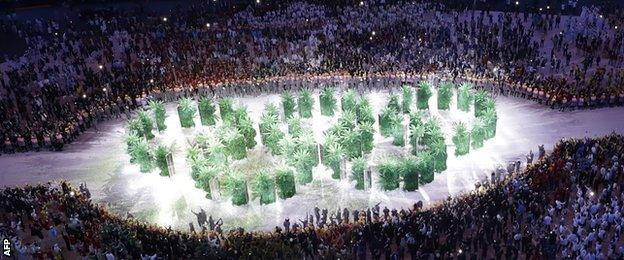
Green games: The Olympic rings were represented by as trees
These have been difficult years and months leading to this moment. And so the mood was one of relief that it was actually here, that the scandals and scares that have blighted the build-up at last have something more life-affirming to crash up against.
The Brazil now hosting these Olympics is not the same one that won the sometimes nuanced honour of hosting them. The economy is mired in deep recession, with GDP shrunken by a tenth and protests both in the streets and from those paid to police them.
The president who secured Rio's bid is about to stand trial on charges of disrupting a corruption investigation. His successor is suspended from office and currently being impeached; the stand-in stand-in, Michel Temer, may at least have made the Maracana but currently has an approval rating of just 14%, and was booed loudly as he declared the Games open.
Austerity is not a new facet of the summer Olympics. London's own bid came before a recession that would have rendered it unviable; Athens' Games in 2004 helped trigger Greece's own slide into financial chaos.
Yet these Olympics have more to cope with still. Revelations of state-sponsored doping on an eye-watering scale have not stopped the International Olympic Committee (IOC) admitting 271 Russian athletes from an original entry list of 389, even as the World Anti-Doping Agency it helps fund had called for a total ban.
More than 100 athletes from other nations competing here have previously served doping bans, while just last month further retests of samples from the 2008 and 2012 Olympics brought the number of athletes to retrospectively test positive from those Games to 98.
Even as those Russian athletes walked into the Maracana, even as spectators around the world wonder as never before whether they can genuinely trust the superhuman performances they will see over the next fortnight, the IOC continues to underfund and obfuscate; while it receives $1.23bn from American broadcaster NBC alone, it contributes only $15m a year to Wada's fight to keep sport clean.
None of that is Brazil's fault. And while some venues have been finished with athletes long ago landed at Galeao airport - and more than a million tickets yet unsold, and transport between the disparate venues still creaking - to expect perfection in an imperfect city, at a Games run by a flawed governing body, is to be both unfair and unrealistic.
"You managed this at a very difficult time in Brazilian history," IOC president Thomas Bach told the cheering crowd on Friday. "We always believed in you."
He should keep his fingers crossed. No-one yet knows whether the long-term benefits of these Olympics will touch the lives outside of the tourist beaches at Copacabana and Ipanema or the middle-class enclaves out west in Barra da Tijuca, or whether those disenfranchised in the favelas will be able to get near the fancy new yet fenced-off stadiums.
This is an Olympics where the torch parade was stoned and a late poll indicated that only 16% of Brazilians were enthusiastic about the Games.
And yet it can all still work, all magically come together, if only for one glorious party before an equally gargantuan hangover to follow.
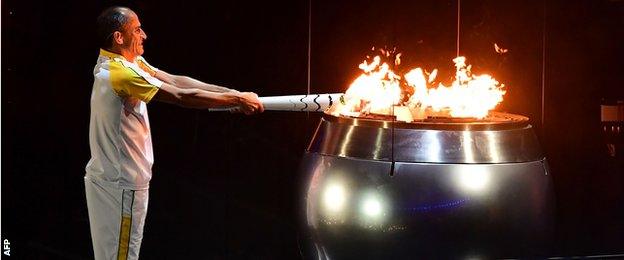
Brazilian long-distance runner Vanderlei de Lima lit the Olympic flame
And if it does, it will be because of two things: the remarkable geographical swagger of this city of surf and mountains and sunshine, and the warmth and passion of the Cariocas who live here.
One of the three key themes of Fernando Meirelles' ceremony on Friday, with a budget a tenth of that used by Danny Boyle four years ago - was gambiarra, which means to make do. If these turn out to be the Make-Do Olympics, that is just fine.
Because even in a tainted era, the Olympics still matter. No global sporting event brings together so many nations; at few other moments are the eyes of the world focused on such a small segment of the planet's surface.
Over the next 16 days returning heroes like Usain Bolt, Serena Williams and Michael Phelps will try to hold that gold standard once more. Young pretenders yet unknown will rise to become fresh stars. We will scream and shout and care about sports we ignore across the intervening years.
There will be disappointments and denigration. There will be cheats we only find out about later, and others we never find out about at all.
Even in Vanderlei de Lima's triumphal finale there was disenchantment. In keeping with a ceremony that featured a section on record-breaking global temperatures, melting ice-caps and rising sea levels, Meirelles had wanted the cauldron lit by an environmental activist.
You could point out the incongruity of such a statement in a city whose abundant waters remain horrendously polluted despite all the years of promises, at a non-sustainable event that brings the youth of the world together by jet plane.
Yet there was symbolism in the moment the Olympic rings grew from the floor of the Maracana as lush fresh vegetation grown from seeds planted by local volunteers.
These Olympics must be about a fresh start from contaminated soil, about replenishment rather than rampant chicanery and commercialism. It is asking an awful lot for two weeks of sport to make up for all that has taken us to this point. But it may just happen.
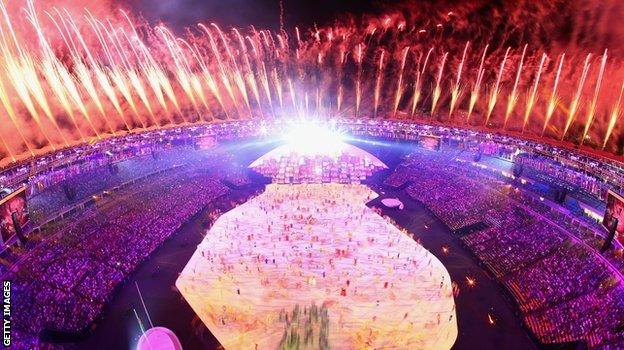
Rio's Maracana stadium provided the backdrop to the opening ceremony
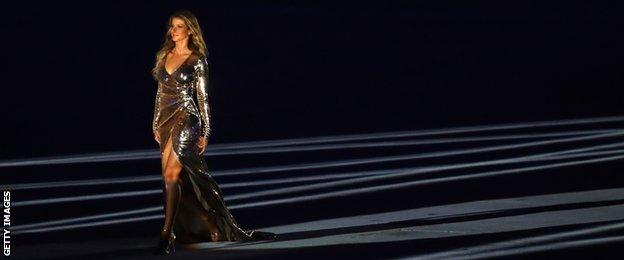
Gisele Bundchen took her final catwalk as a supermodel as Brazil's famous Girl From Ipanema song played out
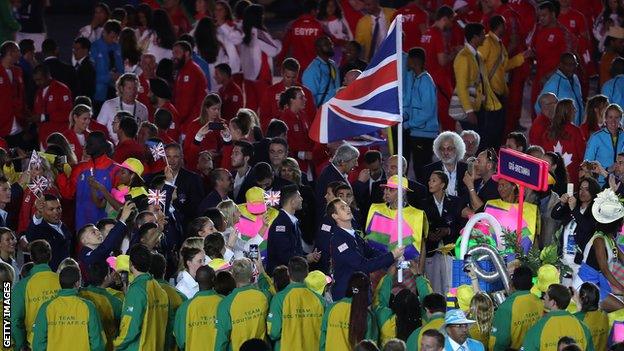
Wimbledon winner Andy Murray led Team GB into the stadium
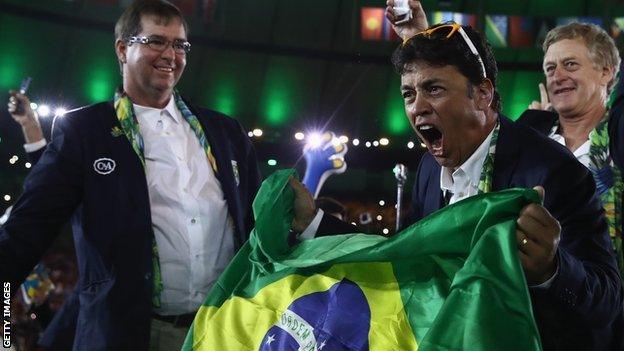
The Brazilian team were the last competitors to enter
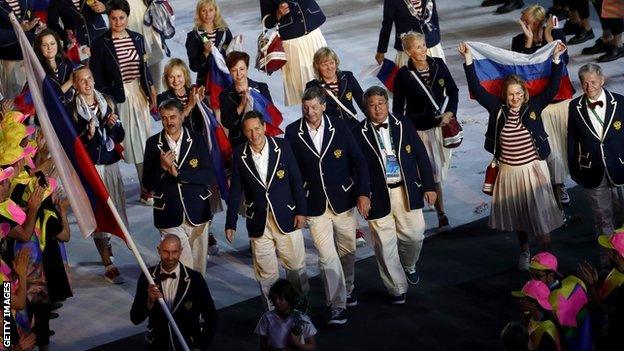
Russian athletes are under more scrutiny then most after the state doping scandal
- Published6 August 2016
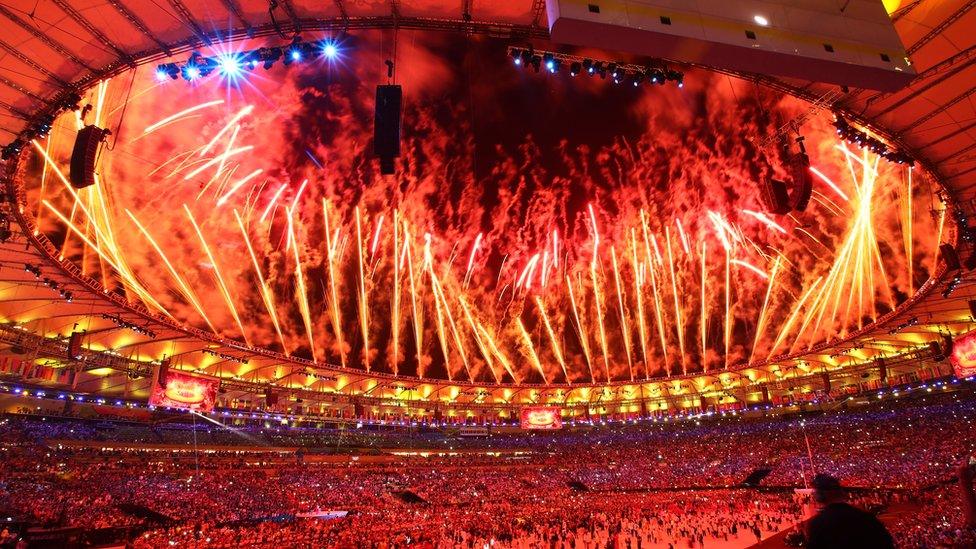
- Published6 August 2016
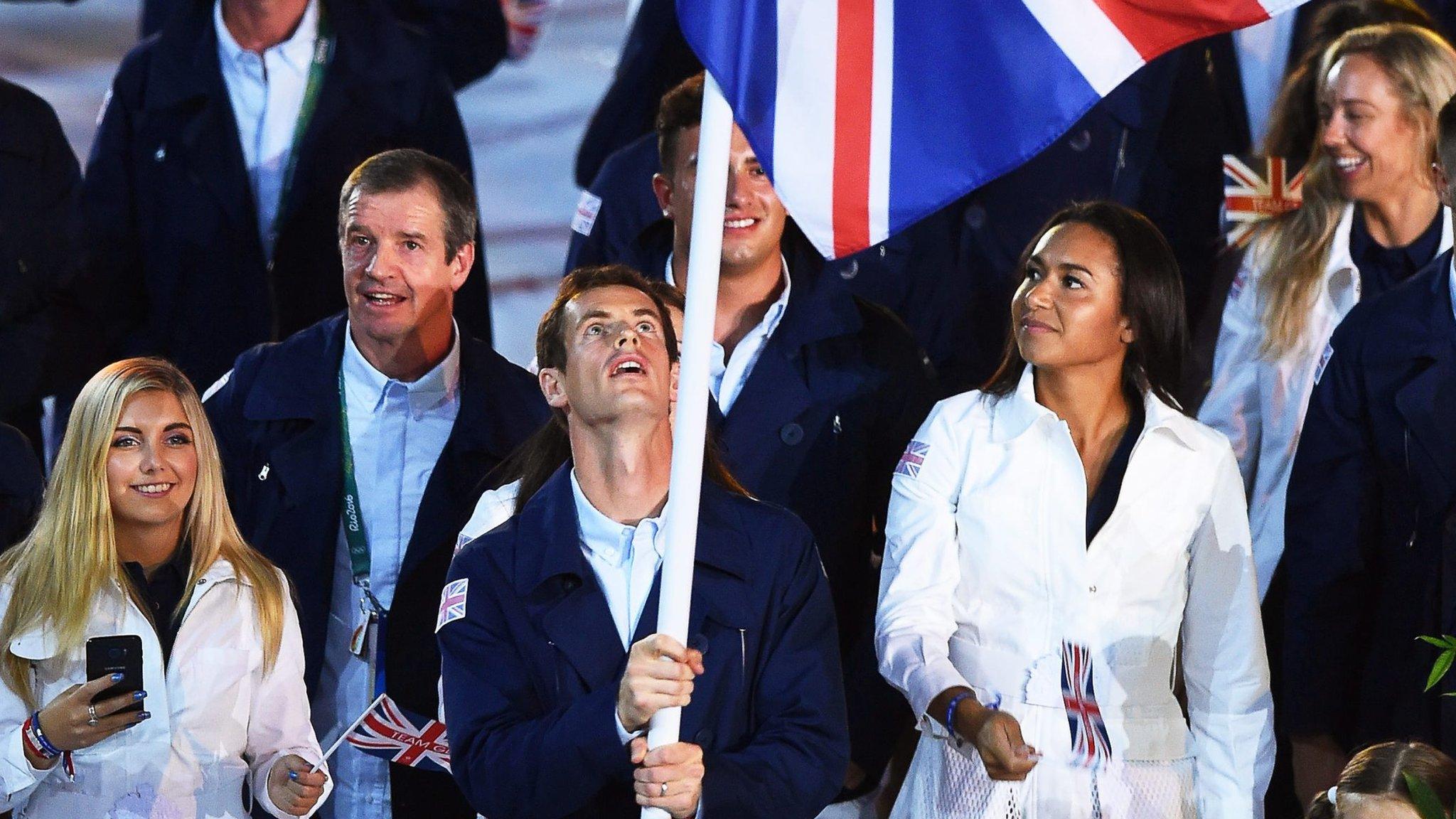
- Published6 August 2016
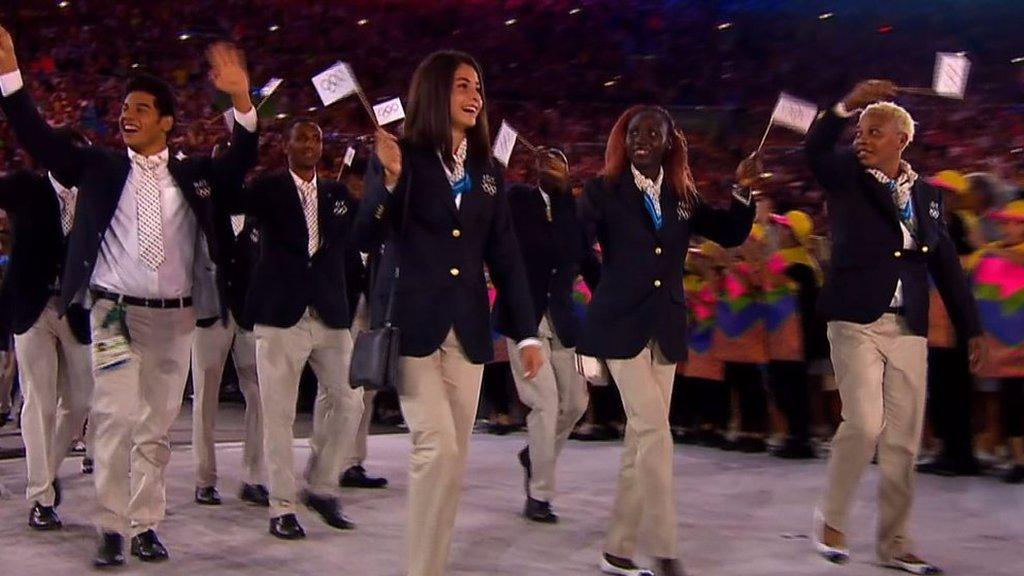
- Published18 August 2016

- Published3 August 2016
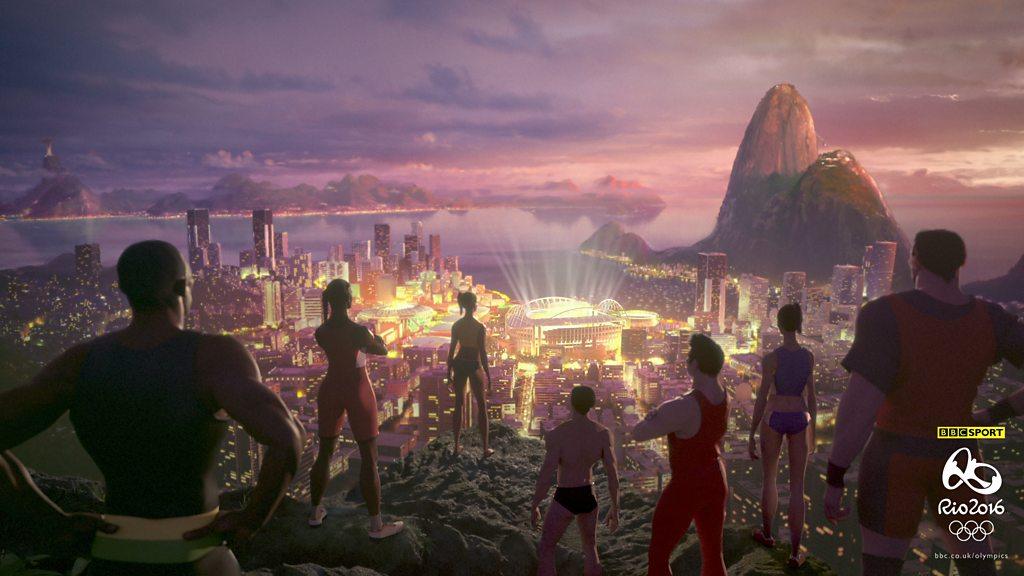
- Published19 July 2016
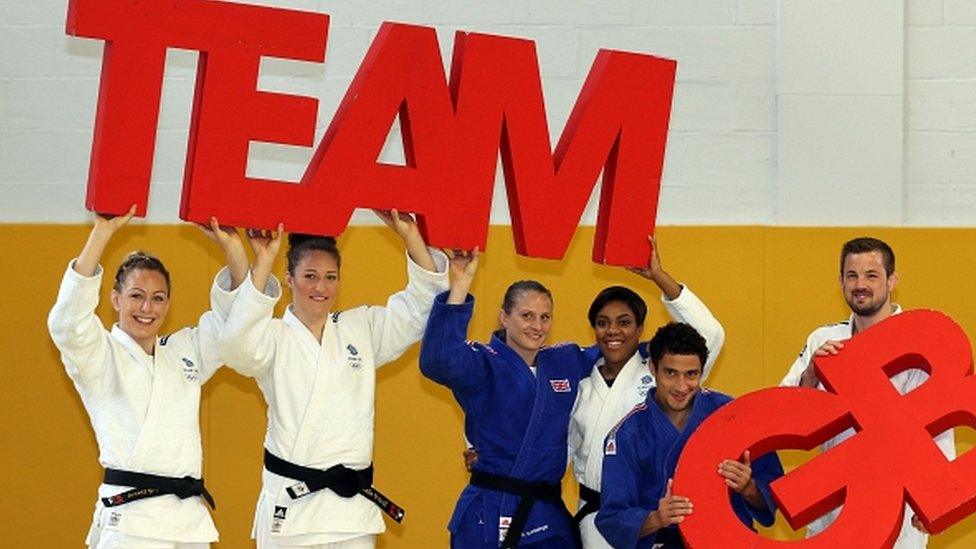
- Published3 August 2016
